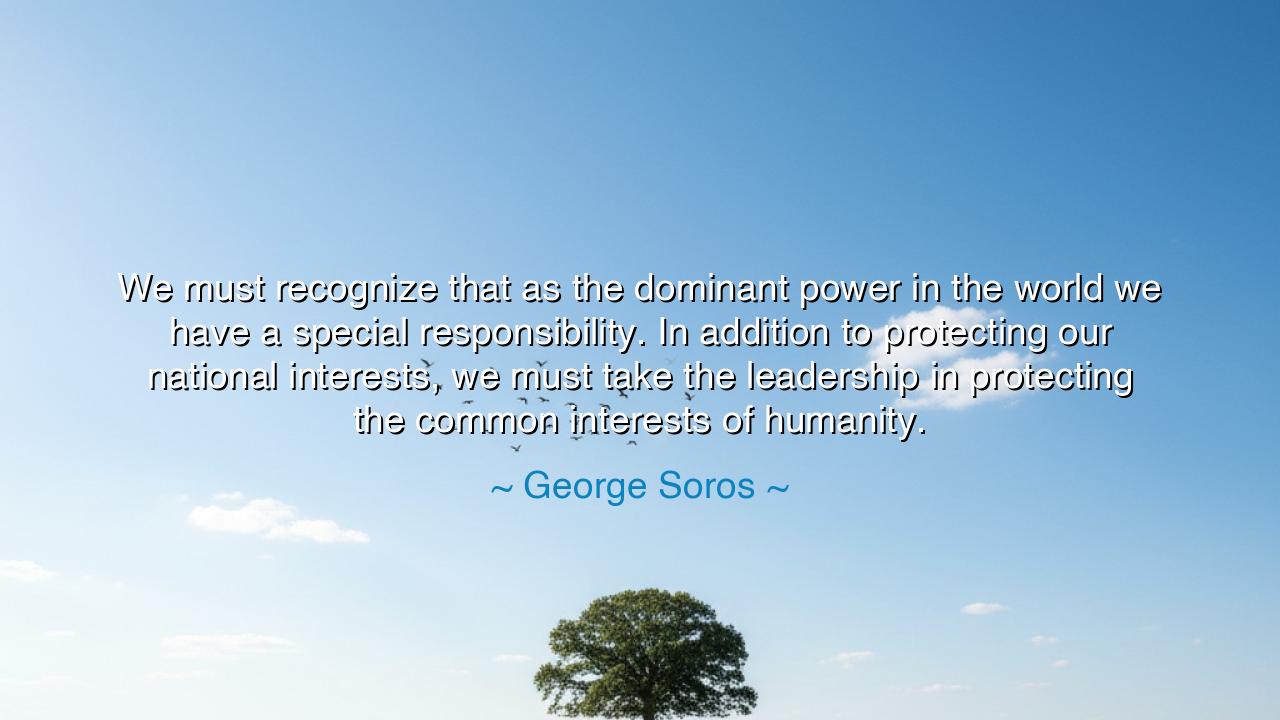
We must recognize that as the dominant power in the world we have
We must recognize that as the dominant power in the world we have a special responsibility. In addition to protecting our national interests, we must take the leadership in protecting the common interests of humanity.






When George Soros said, “We must recognize that as the dominant power in the world we have a special responsibility. In addition to protecting our national interests, we must take the leadership in protecting the common interests of humanity,” he was not merely speaking of nations and policies — he was invoking a moral law as old as civilization itself. Beneath his words lies the eternal truth that power and responsibility are bound together, and that true greatness is measured not by what one possesses, but by how one uses it for the good of all. His message is not one of dominance, but of duty — a reminder that strength without compassion becomes tyranny, while leadership guided by conscience becomes light for the world.
The origin of this quote rests in Soros’s lifelong study of politics, economics, and human nature. As a survivor of war and totalitarianism, he had witnessed firsthand how unchecked power can destroy the soul of nations. From the ashes of conflict, he built his philosophy upon the belief that prosperity and freedom must serve a higher purpose — the advancement of humanity itself. His words were spoken in a world reshaped by globalization, where one nation’s actions reverberate across all others. He saw that the mightiest countries, especially those blessed with wealth and influence, cannot retreat into isolation. For in the age of interdependence, the destiny of one people is intertwined with the fate of all.
Throughout the ages, the wisest rulers understood this sacred bond between power and moral stewardship. Marcus Aurelius, emperor of Rome, wrote in his meditations that the ruler must see himself not as master of men, but as servant of the whole. King Ashoka of India, after the devastation of Kalinga, renounced conquest and vowed to govern with compassion, spreading peace and justice instead of fear. These ancient figures, like Soros centuries later, knew that leadership is not conquest — it is guardianship. The strong must protect, not exploit. The powerful must uplift, not oppress. For the measure of any empire or individual is not in how high they climb, but in how many they raise along with them.
Soros’s quote also reflects a deeper understanding of global interconnection. In the old world, nations could pretend that the suffering of others was distant, that oceans and borders would shield them from consequence. But in the modern age, plague, poverty, war, and climate know no boundary. To protect one’s “national interests” while ignoring the world’s suffering is to build walls of glass in a storm. He reminds us that humanity’s common interests — peace, justice, sustainability, and dignity — are not luxuries, but necessities. To abandon them is to imperil not only others, but ourselves.
Consider the lesson of the Marshall Plan after the Second World War. When Europe lay in ruins, the United States — then emerging as the world’s dominant power — chose not to exploit its victory, but to rebuild its former enemies. It poured resources, labor, and compassion into the restoration of nations once sworn against it. This act, born from a recognition of shared humanity, did not weaken America’s standing; it solidified it. It proved that leadership rooted in generosity endures far longer than leadership rooted in fear. Such was the spirit Soros sought to revive — that the greatness of a nation is found not in its wealth alone, but in the goodness of its purpose.
In the style of the ancients, let us say that the world is a vast ship, and those with the strongest hands must guide its helm not for their own voyage, but for all aboard. To lead is to bear weight; to be powerful is to be accountable. The “special responsibility” Soros speaks of is not a burden, but a calling — to act as stewards of a shared planet, to use wisdom and empathy where others might use force. When the strong care only for themselves, the world fractures. But when they extend their might toward mercy, civilization advances toward harmony.
So let the lesson of these words endure: power without virtue corrupts, but power with compassion redeems. Whether one leads a nation, a community, or a household, the principle is the same — greatness demands service. Protect what is yours, yes, but remember that the world beyond your walls is also your inheritance. To act for the common good is not to weaken yourself, but to fulfill your highest nature. As George Soros reminds us, in every era and every heart, the call remains the same: the strong must lead not by domination, but by devotion — not by fear, but by the unyielding courage to serve humanity itself.






AAdministratorAdministrator
Welcome, honored guests. Please leave a comment, we will respond soon